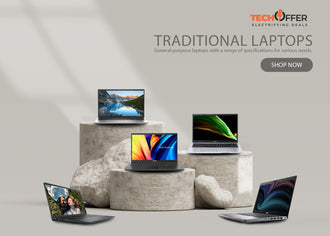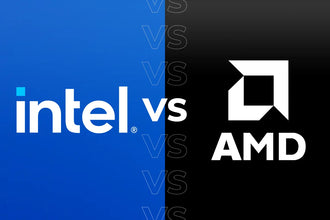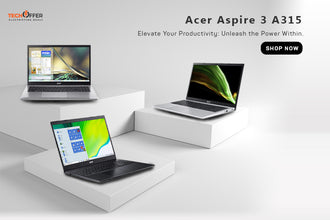
Why Is My Desktop/Laptop Slow All Of A Sudden
- AirPod, Events, gaming, How To's, lagging, Laptop, Laptop Gaming, PC Gaming, performance
- 30 Mar, 2020
It is not a new thing in the IT world for end users to experience a dramatic fall in the performance of their PCs or Laptops. But when trying to decipher factors that can slow down the performance of your system, it is wise to consider various angles (both hardware and software).
For example, one can automatically assume that he/she needs to upgrade the RAM of the system because he/she listened or watched a Youtube video that said so, not knowing that a particular software in the system (installed newly) is conflicting with another installed software, thereby overclocking system memory or you may just have a bad RAM, HDD or SSD.
In this article, I will help you troubleshoot (cross the t'ss and dot the i'ss) your system to ascertain the wisest decision to take when such a thing occurs to your system. NB: This tutorial catters to those who use mainly Windows Operating Systems and I'm assuming your system doesn't have a crappy hardware cuz if it does, it could probably be hardware issues.
So, what could cause a system to slow down all of a sudden?
1. Virus
How have you been protecting your system? Viruses are the main cause for a system rapid drop in performance. Lots of virus are in the market this days and gone are the days one thinks the only way to be infected with a virus is via flash sticks or emails. This days, websites and downloads can easily infect your system with a virus thereby causing your system to drop drastically performance wise.
You need to get a very good anti-virus software to support the built-in Windows Defender in your system. I recommend you get a Mcafee Anti-virus. I have been using it and it works well for me. Make sure you update regularly.
2. Anti-Virus
The name Anti-Virus should sound positive considering what we are talking about, but sometime it doesn't. Some anti-virus which are undoubtedly tasked to protect your system from harm, can cause more harm than good in your laptop or desktops. Some anti-virus are known to cause harm to systems by slowing it down and damaging some keyboard keys. This maybe the first time you have heard this but it is very very true.
Anti-virus softwares are not the only culprit of this. Host of other softwares out there can slowdown your system because of incompatibility and in some cases, they can damage your system. In other not to mention names, always take a mental check of your system. At the point where it started or you noticed that the system has slowed or is slowing down, what is that change you made to the system? Which software did you install last? What was the last thing you did to the system that could cause the sudden drop in performance.
Needless to mention, even the best anti-virus in the market are also known to drain system resources by constantly scanning and sometimes updating patches in the background. This is why most of the time, its advisable to schedule system scanning and updating when you are not actively using the system.
3. How Many Software Running In The Background?
Typically, when you buy a new laptop or desktop, it comes pre-installed with few essential softwares which is why the system is always at its optimum performance level. Hence the fewer the softwares - means the fewer the software running in the background and this translates to a better and optimized performance.
But as the system ages, as you as the end user keep installing and installing more and more unnecessary software in the system, the system will automatically slow down in performance because the more you install softwares in the system, the more there are many running in the background.
This doesn't only affects the system performance, it also affects the startup time. You may notice that when you got your system newly, it takes as little as 10 seconds to boot up but as time goes on, it now takes forever to boot. This is as a result of too many softwares that needs to startup before the system boots completely.
4. Your System Specifications
Most people don't consider system specifications before they purchase a system. Before buying a system, you have to consider what you are using the system for, else you will regret buying that system. For instance: if you are an architect and always use architectural softwares like Archi-Cad, Auto-Cad, SketchUp etc, buying a system that runs only 2gb or 4gb RAM with a clock speed of 1.5GHz will automatically fail you.
Even if those softwares runs very well for one or two months after you purchased your system, from 4 months onwards, the system will be slowed down and sometimes unusable because they softwares installed in the system is overclocking and over working the system.
So always inquire from a trained professional the specification of the system (Laptop or Desktop) you need to buy before purchasing that system. If you are looking to buy a laptop or desktop, contact @tech-offer.com for best prices, genuine products and professional guidance.
5. Bloatwares.
Bloatwares are simply softwares which came pre-installed by the manufacturers of your Laptop or Desktop PCs. These softwares are not to be confused with essential softwares, though sometimes, a bloatware could be essential. Bloatwares are basically softwares your system manufacturers are forcing you to use even though you don't want to. But most bloatwares are useless and they need to be uninstalled from the system because they also cause your system to slow down.
Bad news is, most bloatwares cannot be uninstalled. Though from traditional uninstallation method. But you can google around and find bloatware remover specifically for your system manufacturer and it will help you to remove it.
6. StartUp Programs
Like a I said earlier, the more software you install, the more startup software you will have in your system. Startup softwares are basically softwares that starts up whenever your system boots. If you have too much of them, your system will definitely take ages to boot.
If uninstalling these softwares is not an option for you, then it would be wise for you to at least prevent them from starting up (disable) as your system boots so as to allow your system boot up faster and perform better. For you to remove or disable a software from startup...
1. Click on Start Button an type "msconfig.exe" without the commas and press ENTER
2. System Configuration Dialog will open
3. Select the Startup Tab and uncheck all the boxes to the programs you want to disable from startup
4. Make sure you don't disable what you don't understand.
5. Click ok and restart your computer for the changes to take effect.
I mean, nobody needs Skype, Spotify, Viber etc to startup with Windows whenever you boot your computer! You almost always close them up again before you proceed, so why not just stop them. Think logically.
7. Quit Clicking NEXT & NEXT & NEXT While Installing Free Softwares
Most of the softwares today are free and one wonders how they make money. Well they make money by bundling other lesser trusted softwares in there software. These lesser trusted softwares pay them for a chance to be installed in your system. Have you ever noticed when you install one software you notice about two or more softwares installed with it? Before you say what-a-fuck, you did agree to it.
Most people are so excited about installing a software that will solve a particular problem for them that they just click NEXT and NEXT and NEXT and NEXT to install the software quickly not knowing they are agreeing to the installation of other softwares.
So I advice you, before clicking next to install any software, take a moment and read what you are agreeing on. Trust me, you will be glad you did and agreement is usually 2 to 3 lines, is not like terms and condition that nobody ever reads. lol.
Alright, that's it for today. If you have any other additional measure you think one should take, please leave a comment below and if they article didn't help you in anyway, let us know the exactly problem you are facing in the comment box below so as to know how best to help you.
For example, one can automatically assume that he/she needs to upgrade the RAM of the system because he/she listened or watched a Youtube video that said so, not knowing that a particular software in the system (installed newly) is conflicting with another installed software, thereby overclocking system memory or you may just have a bad RAM, HDD or SSD.
In this article, I will help you troubleshoot (cross the t'ss and dot the i'ss) your system to ascertain the wisest decision to take when such a thing occurs to your system. NB: This tutorial catters to those who use mainly Windows Operating Systems and I'm assuming your system doesn't have a crappy hardware cuz if it does, it could probably be hardware issues.
So, what could cause a system to slow down all of a sudden?
1. Virus
How have you been protecting your system? Viruses are the main cause for a system rapid drop in performance. Lots of virus are in the market this days and gone are the days one thinks the only way to be infected with a virus is via flash sticks or emails. This days, websites and downloads can easily infect your system with a virus thereby causing your system to drop drastically performance wise.
You need to get a very good anti-virus software to support the built-in Windows Defender in your system. I recommend you get a Mcafee Anti-virus. I have been using it and it works well for me. Make sure you update regularly.
2. Anti-Virus
The name Anti-Virus should sound positive considering what we are talking about, but sometime it doesn't. Some anti-virus which are undoubtedly tasked to protect your system from harm, can cause more harm than good in your laptop or desktops. Some anti-virus are known to cause harm to systems by slowing it down and damaging some keyboard keys. This maybe the first time you have heard this but it is very very true.
Anti-virus softwares are not the only culprit of this. Host of other softwares out there can slowdown your system because of incompatibility and in some cases, they can damage your system. In other not to mention names, always take a mental check of your system. At the point where it started or you noticed that the system has slowed or is slowing down, what is that change you made to the system? Which software did you install last? What was the last thing you did to the system that could cause the sudden drop in performance.
Needless to mention, even the best anti-virus in the market are also known to drain system resources by constantly scanning and sometimes updating patches in the background. This is why most of the time, its advisable to schedule system scanning and updating when you are not actively using the system.
3. How Many Software Running In The Background?
Typically, when you buy a new laptop or desktop, it comes pre-installed with few essential softwares which is why the system is always at its optimum performance level. Hence the fewer the softwares - means the fewer the software running in the background and this translates to a better and optimized performance.
But as the system ages, as you as the end user keep installing and installing more and more unnecessary software in the system, the system will automatically slow down in performance because the more you install softwares in the system, the more there are many running in the background.
This doesn't only affects the system performance, it also affects the startup time. You may notice that when you got your system newly, it takes as little as 10 seconds to boot up but as time goes on, it now takes forever to boot. This is as a result of too many softwares that needs to startup before the system boots completely.
4. Your System Specifications
Most people don't consider system specifications before they purchase a system. Before buying a system, you have to consider what you are using the system for, else you will regret buying that system. For instance: if you are an architect and always use architectural softwares like Archi-Cad, Auto-Cad, SketchUp etc, buying a system that runs only 2gb or 4gb RAM with a clock speed of 1.5GHz will automatically fail you.
Even if those softwares runs very well for one or two months after you purchased your system, from 4 months onwards, the system will be slowed down and sometimes unusable because they softwares installed in the system is overclocking and over working the system.
So always inquire from a trained professional the specification of the system (Laptop or Desktop) you need to buy before purchasing that system. If you are looking to buy a laptop or desktop, contact @tech-offer.com for best prices, genuine products and professional guidance.
5. Bloatwares.
Bloatwares are simply softwares which came pre-installed by the manufacturers of your Laptop or Desktop PCs. These softwares are not to be confused with essential softwares, though sometimes, a bloatware could be essential. Bloatwares are basically softwares your system manufacturers are forcing you to use even though you don't want to. But most bloatwares are useless and they need to be uninstalled from the system because they also cause your system to slow down.
Bad news is, most bloatwares cannot be uninstalled. Though from traditional uninstallation method. But you can google around and find bloatware remover specifically for your system manufacturer and it will help you to remove it.
6. StartUp Programs
Like a I said earlier, the more software you install, the more startup software you will have in your system. Startup softwares are basically softwares that starts up whenever your system boots. If you have too much of them, your system will definitely take ages to boot.
If uninstalling these softwares is not an option for you, then it would be wise for you to at least prevent them from starting up (disable) as your system boots so as to allow your system boot up faster and perform better. For you to remove or disable a software from startup...
1. Click on Start Button an type "msconfig.exe" without the commas and press ENTER
2. System Configuration Dialog will open
3. Select the Startup Tab and uncheck all the boxes to the programs you want to disable from startup
4. Make sure you don't disable what you don't understand.
5. Click ok and restart your computer for the changes to take effect.
I mean, nobody needs Skype, Spotify, Viber etc to startup with Windows whenever you boot your computer! You almost always close them up again before you proceed, so why not just stop them. Think logically.
7. Quit Clicking NEXT & NEXT & NEXT While Installing Free Softwares
Most of the softwares today are free and one wonders how they make money. Well they make money by bundling other lesser trusted softwares in there software. These lesser trusted softwares pay them for a chance to be installed in your system. Have you ever noticed when you install one software you notice about two or more softwares installed with it? Before you say what-a-fuck, you did agree to it.
Most people are so excited about installing a software that will solve a particular problem for them that they just click NEXT and NEXT and NEXT and NEXT to install the software quickly not knowing they are agreeing to the installation of other softwares.
So I advice you, before clicking next to install any software, take a moment and read what you are agreeing on. Trust me, you will be glad you did and agreement is usually 2 to 3 lines, is not like terms and condition that nobody ever reads. lol.
Alright, that's it for today. If you have any other additional measure you think one should take, please leave a comment below and if they article didn't help you in anyway, let us know the exactly problem you are facing in the comment box below so as to know how best to help you.




please visit https://www.digitalgraphiks.ae/web-design-agency for more info.